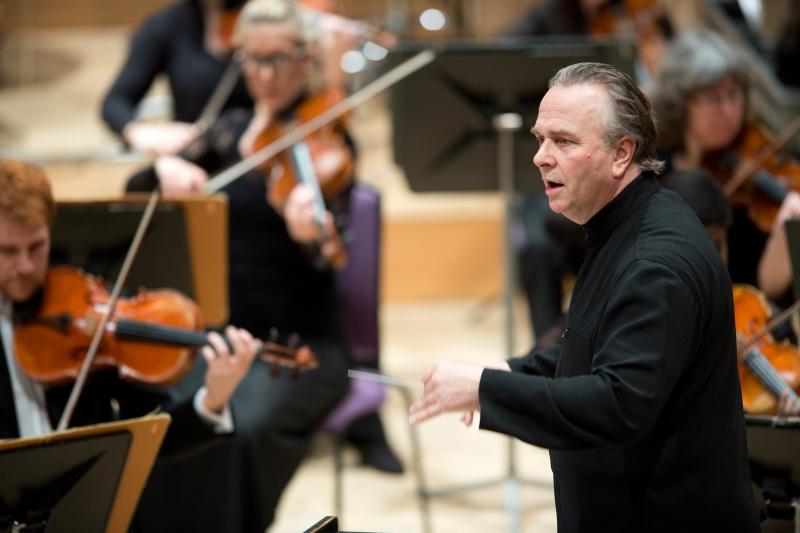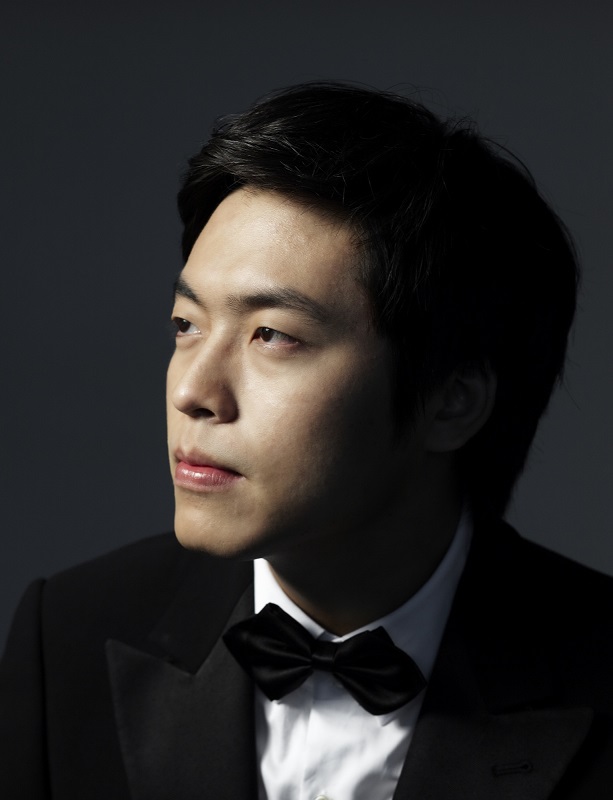Kim, Hallé, Elder, Bridgewater Hall, Manchester | reviews, news & interviews
Kim, Hallé, Elder, Bridgewater Hall, Manchester
Kim, Hallé, Elder, Bridgewater Hall, Manchester
A new British symphony is born, surrounded by lashings of romantic style

The world premiere of a symphony by a British composer – Huw Watkins – was the chief attraction in the latest Hallé programme with Sir Mark Elder at the Bridgewater Hall. The other music on the programme, however, held interest and indeed created a foil to Watkins’ work.
But first to his Symphony. Anyone looking for a contribution to a perceived “tradition” of British symphony writing would be hard put to place this one. It is of itself: one of a kind. Granted, it’s written for a fairly conventional large orchestra, but with nothing to frighten the horses in sound effect terms. Watkins can build a big and percussive sound (and didn’t we know it by the time we heard his last, stop-in-full-flow, bar), but he does so by effective traditional orchestration.
We were told the orchestra like it very much, and that was pretty clear
It’s also full of harmonious chord construction, has wide, swooping and soaring melodic intervals, and clearly incisive, often short, rhythmic units: in short, very listenable even if you don’t like “modern music”. Intertwining of rhythms and motifs to create a composite and subtly intriguing orchestral sound is something Watkins does very well.
There are two movements, of which Watkins’ own brief programme note says the first is very fast throughout, and the second has a more reflective character, “at least initially”. Notice the qualification. In reality, both finish a long way from the points where they start, and the impression at first created that Watkins has really written a concerto for orchestra (after his other concertos for soloists) has to give way to the conclusion that he’s created something symphonic in the sense that it travels. It’s an abstract musical argument (no programme), but it evolves, develops and surprises.
The opening, Allegro molto in 5/4 and then 3/4, mainly alternating between the two subsequently, displays solo and sectional themes in two groups and seems to be following an exposition-development-recapitulation plan, until it’s interrupted and almost abruptly fades away and splinters into pieces at the end. The second movement, Lento at the outset, features lovely cantilenas with oboe, flute, clarinet and harp prominent. But then things begin to change, and by the time the music ends the full orchestra is hammering away at an insistent, powerful rhythm. And it stops – just like that.
The Hallé sound was at its resplendent best in sections of this work, Elder in complete command of the intricacies and rising tensions of the piece. (We were told the orchestra like it very much, and that was pretty clear.)
 The Berlioz overture and Brahms piano concerto that completed the programme provided points of comparison for the new work, as it happened. Rob Roy was one of Berlioz’ Prix de Rome pieces and he thought he’d destroyed all trace of it after the first performance, so much so that he re-used one of its main ideas in Harold in Italy. But the original has survived, and has its own vivid orchestration and big finish. There’s a tune for cor anglais and harp accompaniment (for which hear pipes and bardic strumming, perhaps – this is inspired by Walter Scott), and the music yearns its way for some distance until there’s an operatic-style trombone interruption – twice. Sir Mark, it hardly needs to be said, is alert to all things dramatic in scores like this.
The Berlioz overture and Brahms piano concerto that completed the programme provided points of comparison for the new work, as it happened. Rob Roy was one of Berlioz’ Prix de Rome pieces and he thought he’d destroyed all trace of it after the first performance, so much so that he re-used one of its main ideas in Harold in Italy. But the original has survived, and has its own vivid orchestration and big finish. There’s a tune for cor anglais and harp accompaniment (for which hear pipes and bardic strumming, perhaps – this is inspired by Walter Scott), and the music yearns its way for some distance until there’s an operatic-style trombone interruption – twice. Sir Mark, it hardly needs to be said, is alert to all things dramatic in scores like this.
Brahms’ Second Piano Concerto (of which Charles Hallé, as pianist, very nearly gave the British premiere – he announced it for a London concert and would have done it if the parts hadn’t been held up, finally getting there in Manchester a little later) has already been recorded, along with the first, by Leeds Competition 2006 winner Sunwook Kim (pictured above right), Sir Mark and the Hallé. Their interpretation is vigorous, passionate and winsome.
The opening was gentle, beautifully articulated by the strings – the two bodies of violins now on opposite sides of the platform, unlike in the earlier works. Kim has a bold, Romantic soul and an ability to make the familiar sound fresh and unusual. By the end of the first movement, there seemed little scope for any more appassionato to be evinced, as requested, in the second, but they gave it everything they could in the central section to add weight of emotion. The Andante wove its nocturne-like spell (lovely cello solo by Nicholas Trygstad), with exceptionally gentle tone from Kim, and in the finale the lilting rhythms were enjoyed to their utmost, with flexibility of pulse, a sense of dance and an appealing, nostalgic haze – before a very lively tail-piece, both soloist and conductor united in determination to make it so.
rating
Share this article
The future of Arts Journalism
You can stop theartsdesk.com closing!
We urgently need financing to survive. Our fundraising drive has thus far raised £33,000 but we need to reach £100,000 or we will be forced to close. Please contribute here: https://gofund.me/c3f6033d
And if you can forward this information to anyone who might assist, we’d be grateful.

Subscribe to theartsdesk.com
Thank you for continuing to read our work on theartsdesk.com. For unlimited access to every article in its entirety, including our archive of more than 15,000 pieces, we're asking for £5 per month or £40 per year. We feel it's a very good deal, and hope you do too.
To take a subscription now simply click here.
And if you're looking for that extra gift for a friend or family member, why not treat them to a theartsdesk.com gift subscription?
more Classical music
 Mahan Esfahani, Wigmore Hall review - shimmering poise and radical brilliance
Magnificent demonstration of a lifelong dedication to the harpsichord
Mahan Esfahani, Wigmore Hall review - shimmering poise and radical brilliance
Magnificent demonstration of a lifelong dedication to the harpsichord
 Gromes, Hallé, Chauhan, Bridgewater Hall, Manchester review - new concerto and music of triumph
Spirit of Germany in the 1930s captured in Herz’s tense and despondent work
Gromes, Hallé, Chauhan, Bridgewater Hall, Manchester review - new concerto and music of triumph
Spirit of Germany in the 1930s captured in Herz’s tense and despondent work
 Helen Charlston, Sholto Kynoch, Temple Church review - fine singing, powerful stage presence
Coups de théâtre in a well-constructed programme
Helen Charlston, Sholto Kynoch, Temple Church review - fine singing, powerful stage presence
Coups de théâtre in a well-constructed programme
 Ridout, 12 Ensemble, Wigmore Hall review - brilliant Britten and bombastic Brahms
Dazzling solo and ensemble playing in pieces inspired by music of the past
Ridout, 12 Ensemble, Wigmore Hall review - brilliant Britten and bombastic Brahms
Dazzling solo and ensemble playing in pieces inspired by music of the past
 Argerich, Oxford Philharmonic Orchestra, Papadopoulos, Barbican review - the great pianist as life and soul
Her delivery of the Beethoven made it clear that she still merits legend status
Argerich, Oxford Philharmonic Orchestra, Papadopoulos, Barbican review - the great pianist as life and soul
Her delivery of the Beethoven made it clear that she still merits legend status
 Jessica Duchen: Myra Hess - National Treasure review - well-told life of a pioneering musician
Biography of the groundbreaking British pianist who was a hero of the Blitz
Jessica Duchen: Myra Hess - National Treasure review - well-told life of a pioneering musician
Biography of the groundbreaking British pianist who was a hero of the Blitz
 Chamayou, BBC Philharmonic, Morlot, Bridgewater Hall, Manchester review - blasts of Boulez, magical Ravel
Celebration of the two French masters continues in big bangs and gentleness
Chamayou, BBC Philharmonic, Morlot, Bridgewater Hall, Manchester review - blasts of Boulez, magical Ravel
Celebration of the two French masters continues in big bangs and gentleness
 Classical CDs: Snow, shards and swinging oars
Contemporary choral works, revamped lieder plus piano music from Ireland and Scotland
Classical CDs: Snow, shards and swinging oars
Contemporary choral works, revamped lieder plus piano music from Ireland and Scotland
 Bach's Mass in B minor, The English Concert, Bezuidenhout, St Martin-in-the-Fields review - solemnity and splendour
The greatest of choral anthologies smoulders, then flies
Bach's Mass in B minor, The English Concert, Bezuidenhout, St Martin-in-the-Fields review - solemnity and splendour
The greatest of choral anthologies smoulders, then flies
 Sidorova, Philharmonia, Alsop, Royal Festival Hall review - ladies of the dance
Vitality, virtuosity and sensuality on a pan-American trip
Sidorova, Philharmonia, Alsop, Royal Festival Hall review - ladies of the dance
Vitality, virtuosity and sensuality on a pan-American trip
 MacMillan's Ordo Virtutum, BBC Singers, Jeannin, Milton Court review - dramatic journey of a medieval soul
Choral music's finest advocate runs the gamut in an epic battle of heaven and hell
MacMillan's Ordo Virtutum, BBC Singers, Jeannin, Milton Court review - dramatic journey of a medieval soul
Choral music's finest advocate runs the gamut in an epic battle of heaven and hell

Add comment